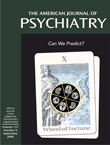Medication or Psychotherapy for Severe Depression
To the Editor:
Dr. Robert J. DeRubeis and colleagues (1) should be commended for a thoughtful and well-executed study examining the relative efficacy of cognitive behavior therapy and antidepressant medication for treating severely depressed adult outpatients. Although questions may exist regarding the authors’ methodology (i.e., Might random regression models be more appropriate for approaching this data set? Might methodological differences between the studies included in the mega-analysis account, at least in part, for the differences in outcome observed?), their primary finding remains that cognitive behavior therapy appears to fare as well as medication in the acute treatment of severe depression. We agree entirely with their assertion that treatment guidelines should not be based on single studies. A number of important questions, however, remain unanswered. The relative safety of cognitive behavior therapy and antidepressant medications, as well as their effectiveness in preventing relapse and recurrence, for example, was not discussed. As important, it was not clear from the data presented whether the improvements in patient functioning described are clinically significant. As Jacobson and Truax (2) noted, statistical comparisons of group differences in outcome provide little information on the variability of response to treatment within the groups or whether the changes observed are clinically meaningful. It would be interesting to know what percentage of patients within the medication and cognitive behavior therapy groups demonstrated a normative level of functioning at the conclusion of treatment or an elimination of their presenting concerns. This can be defined statistically, and the data appear to be available. An analysis of the clinical significance of the improvements observed would be of interest to practicing clinicians.
Findings suggest that a large percentage of patients receiving psychotherapy or antidepressant medications make reliable, clinically significant improvements (3, 4). Although examinations of data of clinical significance frequently result in treatments appearing less effective than standard comparisons of baseline and posttreatment scores suggest, such a finding should be accepted cautiously. A return to normal functioning is a high clinical standard. As Crits-Cristoph (5) observed, “With aspects of patient care that involve death or serious illness, even a small treatment effect might be deemed to be specially important.” This is nowhere more true than in the treatment of severely depressed adults. With this in mind, we suggest that the data analyzed by Dr. DeRubeis et al. (1) may offer new opportunities for empirical inquiry, including examinations of differences in relapse and recurrence and the clinical significance of therapeutic gains.
1. DeRubeis RJ, Gelfand LA, Tang TZ, Simons AD: Medications versus cognitive behavior therapy for severely depressed outpatients: mega-analysis of four randomized comparisons. Am J Psychiatry 1999; 156:1007–1013Google Scholar
2. Jacobson N, Truax P: Clinical significance: a statistical approach to defining meaningful change in psychotherapy research. J Consult Clin Psychol 1991; 59:12–19Crossref, Medline, Google Scholar
3. Nietzel MT, Russell RL, Hemmings KA, Gretter ML: Clinical significance of psychotherapy for unipolar depression: a meta-analytic approach to social comparison. J Consult Clin Psychol 1987; 55:156–161Crossref, Medline, Google Scholar
4. Ogles B, Lambert M, Sawyer J: Clinical significance of the National Institute of Mental Health Treatment of Depression Collaborative Research Program data. J Consult Clin Psychol 1995; 63:321–326Crossref, Medline, Google Scholar
5. Crits-Christoph P: The efficacy of brief dynamic psychotherapy: a meta-analysis. Am J Psychiatry 1992; 149:151–158Link, Google Scholar



